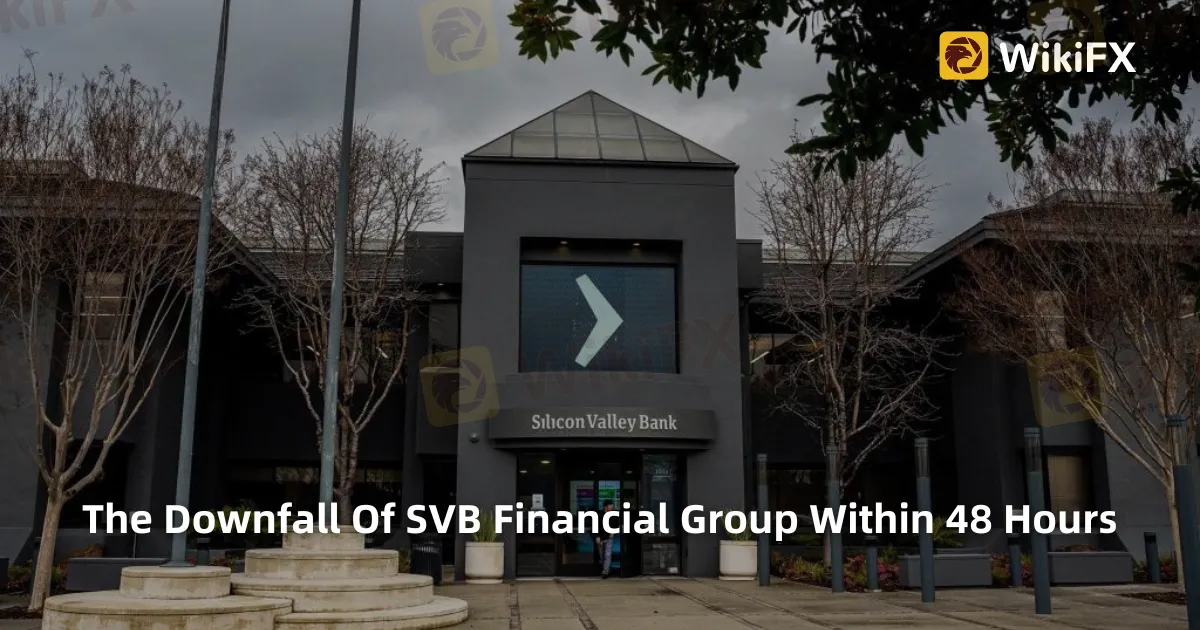简体中文
繁體中文
English
Pусский
日本語
ภาษาไทย
Tiếng Việt
Bahasa Indonesia
Español
हिन्दी
Filippiiniläinen
Français
Deutsch
Português
Türkçe
한국어
العربية
The Downfall Of SVB Financial Group Within 48 Hours
Abstract:SVB Financial Group, which focused on financing tech startups, experienced a swift decline due to rising interest rates, leading to significant losses in the banking industry and beyond.

SVB Financial Group (SIVB.O), which primarily focused on financing tech startups, experienced a swift decline following the rise of interest rates. This downturn had far-reaching impacts, affecting a wide range of asset classes, from money markets to forex.
The collapse of the Santa Clara-based lender was unprecedented since the 2008 failure of Washington Mutual. The bank stocks, both large and small, saw significant losses of hundreds of billions of dollars within a matter of days. The fear of a contagion effect caused by SVB's collapse sent shockwaves throughout the global financial markets.
The tech industry had been thriving, with startups enjoying rapid growth and significant investment. However, rising interest rates triggered a tumultuous period that ultimately resulted in the downfall of SVB Financial Group. This sudden collapse sent shockwaves throughout the banking industry and beyond, as investors grappled with the potential contagion effects.
The impacts of SVB's collapse were felt across numerous asset classes. Money markets, which had previously been stable, were suddenly disrupted, while forex markets experienced significant fluctuations. Additionally, the banking industry was significantly affected, with both major and smaller banks experiencing massive losses.
Despite the concerns and disruptions caused by SVB's collapse, many experts believe that the banking industry will ultimately rebound. However, the impact of this event will likely continue to be felt for some time, as investors continue to grapple with the potential for further contagion effects.
Overall, the swift decline of SVB Financial Group serves as a stark reminder of the interconnectedness of the global financial system. As investors continue to navigate a rapidly changing economic landscape, it's essential to remain vigilant and adapt to changing market conditions.
Install the WikiFX App on your smartphone to stay updated on the latest news.
Download link: https://www.wikifx.com/en/download.html?source=fma3

Disclaimer:
The views in this article only represent the author's personal views, and do not constitute investment advice on this platform. This platform does not guarantee the accuracy, completeness and timeliness of the information in the article, and will not be liable for any loss caused by the use of or reliance on the information in the article.
Read more

WikiFX Forex Prediction Challenge
Unleash Your Trading Influence with Expert Analysis!

The Impact of Interest Rate Decisions on the Forex Market
Interest rate changes determine currency attractiveness, influencing capital flows and exchange rate trends. Understanding this mechanism helps investors navigate the forex market effectively.

How a Housewife Lost RM288,235 in a Facebook Investment Scam
A 47-year-old housewife in Malaysia recently fell victim to an online investment scam, losing a substantial sum of RM288,235 after engaging with a fraudulent scheme advertised on Facebook.

Interactive Brokers Launches Forecast Contracts in Canada for Market Predictions
Interactive Brokers introduces Forecast Contracts in Canada, enabling investors to trade on economic, political, and climate outcomes. Manage risk with ease.
WikiFX Broker
Latest News
INFINOX Partners with Acelerador Racing for Porsche Cup Brazil 2025
Global Panic Builds as Forex Shifts into Risk-Off Mode
SEC Fines Velox Clearing $500,000 for SAR Failures
The Dark Side of Trading Gurus: Are You Following a Fraud?
WikiFX Forex Prediction Challenge
Currency Calculator







